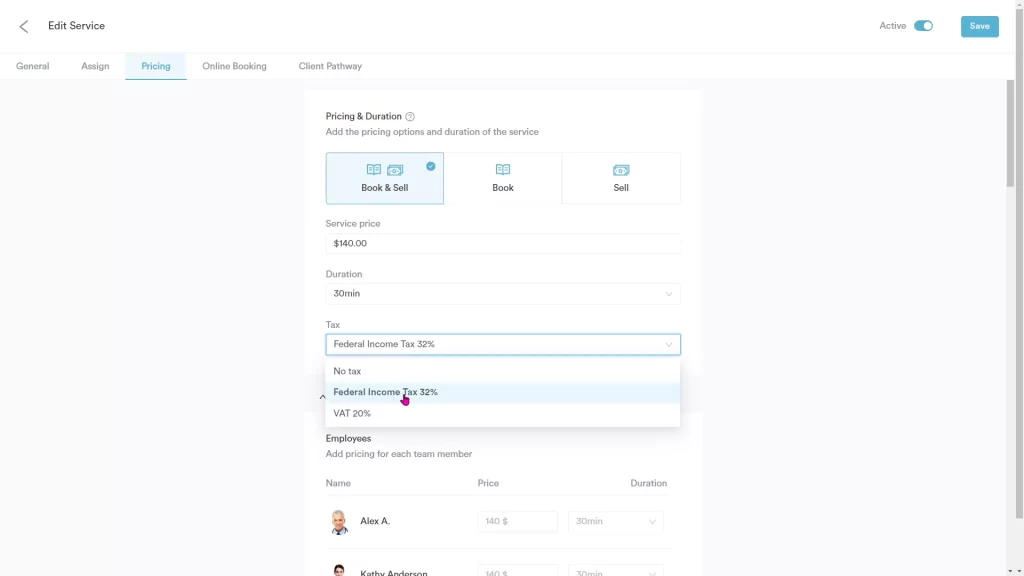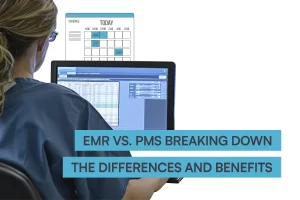You probably didn’t get into the spa or beauty industry because you love crunching numbers.
But as a salon or spa business owner, there are several tax essentials you need to be aware of, like important deadlines, tax forms, and deductible business expenses, to avoid the IRS’s wrath.
Navigating the convoluted world of business taxes and tax season doesn’t have to be a nightmare for salon owners.
In this guide, you’ll learn the basics of U.S. taxes, types of tax deductions and write-offs that apply to a spa or salon, and essential tax documents you need to file.
Disclaimer: This article is meant to be used only for informational purposes and doesn’t constitute financial, legal, or other professional advice. It serves as a starting point, and salon and spa owners should explore state regulations to learn about tax laws that apply to them.
The basics of U.S. taxes for salons and spas
Before diving into specific business owners’ favorite tax write-offs, we need to understand some basic aspects of taxes so you can better understand your tax liability and manage your business’s financial health.
Tax types
There are several taxes that apply to salons and spas:
- Federal Income Tax is a percentage of your business income. There are several tax rates, and they increase as your income goes up.
- State Income Tax regulations vary by state, but most require businesses to file state-specific income tax returns in addition to federal returns.
- Local Income Taxes are present in 16 states and districts like the District of Columbia, New York, and Ohio. Check if your state has a local tax.
- Sales Tax is a tax charged on products and certain services provided to customers. For example, in New Jersey, most spas, barber shops, and beauty and hair salons are exempt from this tax, but services like deep tissue and Swedish massages, tanning services, and tattooing are taxable.
- Employment taxes include various payroll-related taxes that employers pay as contributions. These include Social Security and Medicare taxes (FICA), and federal and state unemployment taxes.
Business structure and tax implications
The taxes you pay depend on the business structure of your spa or salon:
- Sole Proprietorship needs to pay:
- Federal Income Tax
- State Income Tax
- Self-Employment Tax (Social Security and Medicare)
- Estimated Quarterly Tax
- Sales Taxes (if you sell products and services taxable in your state)
- Payroll Taxes (if you have employees): Federal (Social Security and Medicare (FICA) taxes, Federal Unemployment Tax (FUTA) and Income Tax Withholding, and state unemployment taxes (SUTA)
When it’s a good fit: It’s best for small business owners or single-owner salons/spas as it has the least tax implications. However, it offers no liability protection for the owner, meaning your personal assets—such as your home, car, or personal savings—can be used to pay off business debts and tax obligations.
- A Partnership’s tax responsibilities include:
- Federal taxes: Self-employment tax (partners pay it on their share of the partnership’s income), Income Taxes (each partner pays income tax and reports their share of income, deductions, and credits on their personal tax returns), Estimated Quarterly Taxes (partners pay it on their share of the partnership’s earnings.
- State income taxes (partners pay on their share of partnership income), Sales Tax and Use Tax if applicable.
- Payroll taxes
When it’s a good fit: A partnership is ideal for two or more owners who want to share responsibilities and profits. It allows more flexibility, but it still doesn’t provide personal liability protection.
- S-Corporations (S-Corp) are subject to:
- Federal taxes: Income tax (pass-through) and self-employment taxes (for shareholders)
- Payroll Taxes: FICA, FUTA and Income Tax Withholding
- State and local taxes: State-Level S-Corp Taxes (in California), Sales tax and Use tax if applicable
- Quarterly Estimated Tax payments based on shareholders’ expected income
When it’s a good fit: If you want to save on self-employment taxes while maintaining personal liability protection. But it requires more formalities (e.g., regular payroll and board meetings).
- C-Corporations (C-Corp) are taxed on their income at the corporate level. Shareholders also pay taxes on dividends, leading to the concept of double taxation.
- Federal Taxes: Federal corporate income tax on its profits, shareholders pay income tax on their dividends, which leads to double taxation
- State and local taxes: State corporate income tax, Franchise Taxes (e.g. in California), and Sales tax (if they sell goods or services that are subject to it)
- Payroll taxes: Employment taxes: Social Security and Medicare taxes (FICA) and Federal Unemployment Tax (FUTA), Income Tax Withholding, State Unemployment Tax (SUTA)
- Quarterly Estimated Tax payments
- Dividend Taxes
- Property Taxes (if the C-Corp owns real estate)
- Capital Gains Tax (if the C-Corp sells an asset (e.g., real estate or stock) for a profit
When it’s a good fit: It’s suitable for larger salon/spa businesses with multiple owners, expansion plans, or a need to raise capital.
- Limited Liability Company (LLC) offers greater flexibility in taxation and provides limited liability protection for the owners. The taxes depend on the type of LLC:
- A single-member LLC is treated like a sole proprietorship and taxed as such. This is referred to as ‘pass-through’ taxation, which means the LLC itself doesn’t pay federal income taxes, but they’re passed through to the individual members of the LLC.
- Multi-member LLCs are treated like partnerships, with income passing through to members.
- An LLC elects to be either an S-Corp or C-Corp. An S corporation allows business income to pass through to the owner’s personal tax return. While, a C-corporation is subject to double taxation, where both the corporation and shareholders pay taxes.
When it’s a good fit: Best for growing salons and spas that want to have liability protection and maintain pass-through taxation.
Key tax deadlines
Several important tax deadlines should be marked in your calendar to ensure your salon or spa remains compliant and avoids IRS penalties.
To allow enough time for tax preparation, the standard deadline to file an estimated Federal Tax Return is the following year, usually in April; for 2024, it was April 15. (If the deadline falls on a holiday or weekend, it’s moved to the next business day.)
However, some taxpayers (self-employed or with significant investments) should file estimated tax payments quarterly rather than annually. This rule applies if you expect to owe at least $1,000 in US taxes when filing your return and if you are self-employed or have a big investment income.
These are the deadlines for quarterly tax filing for the tax year 2023:
- April 15, 2024
- June 17, 2024
- September 16, 2024
- January 15, 2025
Also, different business tax return deadlines depend on the business type.
If you miss the deadlines, you may be hit with Failure to File and Failure to Pay penalties, which is a percentage of the taxes. The former penalty is 5% of the unpaid tax and may increase up to 25%. While the latter charges 0.5% of the unpaid tax, up to a total of 25%.
Tax deductions and write-offs that commonly apply to spas and salons
The good news is that the majority of your spa or salon business expenses are deductible from your taxable income, also reducing the total amount you need to pay in taxes.
Tax deductions, also called write-offs, allow you to keep more of your hard-earned money in your pocket. They are expenses that the IRS considers ordinary and necessary for your business.
You should know which expenses count as write-offs and keep records of each expense to back up your write-off.
These salon and spa expenses are tax-deductible in the spa and beauty industry.
Equipment and supplies
Equipment, furniture, and supplies are essential for your salon or spa, so they can be deducted from the tax amount. This includes everything from:
- Dryers, straighteners, curling irons, combs, foils, rolls, scissors, caps, clips
- Styling products like hair gel, hairspray, masks
- Facial and massage tables beauty professionals use
- Skincare and beauty products like shampoo, conditioner, hair removal wax, massage oils,
- Salon chairs, carts and stools used by hair stylists
Rent and utilities
One of the biggest expenses for salons and spas is the cost of renting business space. Fortunately, these, along with associated utility expenses, are eligible for tax exemption. This includes:
- The full cost of rent
- Utility costs such as electricity, water, gas, heating, and even waste management services can be deducted as business expenses.
- Common utility expenses: Electricity for workstations, water for services like hair washing, facials, and other treatments, and internet and phone services.
Employee wages and benefits
All employee-related expenses, including wages, tips, bonuses and benefits like health insurance, can be deducted.
Also, payroll taxes, such as Social Security and Medicare taxes (FICA), Federal Unemployment Tax (FUTA), and State Unemployment Taxes (SUTA), are eligible for write-offs.
Marketing and advertising
Marketing and promotion are crucial for your business. Therefore, expenses related to marketing and advertising activities are deductible:
- Cost of website development
- Social media advertising
- Marketing materials like business cards, flyers, brochures
- Trade shows and events
Insurance
Insurance is necessary to protect your salon or spa from various risks. For example, you need business liability insurance to protect you in the event of a data breach or other HIPAA violations.
The good news is that many insurance premiums can be deducted as business expenses.
All types of insurance, like business liability insurance, property insurance, and workers’ compensation insurance, are fully deductible.
Professional fees
Hiring professional service providers, such as accountants, tax professionals, lawyers, or consultants, is generally tax-deductible. This includes everything from tax preparation fees to bookkeeping, legal fees, and consulting services of any kind, as long as they’re incurred for business purposes.
Education and training
If you’re thinking about visiting a course or training session or giving your estheticians and massage therapists the opportunity to educate themselves, fear not; all related expenses to education and training are tax-deductible.
This covers expenses related to industry conferences, workshops, and continuing education courses that help improve skills and business operations.
Understanding business tax credits
Tax credits are different than tax deductions and tax write-offs. They reduce the amount of tax you need to pay, but unlike write-offs that reduce your taxable income, tax credits lower your total tax bill. This way, they can be incredibly helpful in lowering your overall costs.
Find out more about tax credits and how to claim them on the IRS tax credit page.
Essential tax documents for salons and spas in the United States
When it comes to managing your taxes, having the essential tax documents ready can make tax season a much smoother process. Here are the most important tax forms your salon or spa should maintain.
Form W-2: Wage and Tax Statement for each employee
If you have employees at your spa or salon, they should fill out a W-2 form in the current year for the following year. It provides a detailed summary of an employee’s wages and the taxes withheld from their paychecks – Social Security and Medicare taxes.
Form W-3: Transmittal of Wage and Tax Statements
Form W-3 serves as the cover sheet that summarizes all the W-2 forms a business has prepared for its employees. It allows the IRS to reconcile the total wages and taxes reported with the individual W-2 forms.
Schedule C: Profit or Loss from Business (Sole Proprietorship)
Schedule C is a key tax form for salon and spa owners who work as sole proprietors. It is used to report the business’s income, expenses, and profits (or losses) as part of the owner’s personal income tax return.
Schedule SE: Self-Employment Tax Form for Sole Proprietors
Schedule SE is a crucial tax form for sole proprietors. It’s used to calculate and report self-employment taxes, which cover both Social Security and Medicare contributions.
Form 941: Employer's Quarterly Federal Tax Return
Form 941 is a crucial tax form for salon and spa owners with employees. It is used to report payroll taxes, including federal income tax withholding, as well as Social Security and Medicare taxes that are withheld from employee paychecks.
Form 940: Employer's Annual Federal Unemployment (FUTA) Tax Return
Form 940 is used by salon and spa owners to report and pay the Federal Unemployment Tax Act (FUTA) taxes.
State-specific tax forms
The tax obligations for salon and spa owners don’t stop at the federal level. Depending on the state where your business operates, you may need to file various state-specific tax forms that cover income, sales, and unemployment taxes. For example:
- Form 568 and Form IT-204 for that income tax
- Texas Form 01-117, New York Form ST-100 and Florida DR-15 for sales tax
- California DE-9 and New York NYS-45 for state unemployment taxes (SUTA)
So make sure you get familiar with state-specific taxes that apply to you.
Find out how Pabau makes tax management easier
Filing taxes correctly is essential for your salon or spa to stay compliant, avoid penalties, and take advantage of tax deductions.
By understanding the types of taxes you’re responsible for, filling out correct forms, and knowing which tax write-offs apply to your business, you can make the process easier for you and focus on growing your salon or spa.
Speaking of making your taxes easier, Pabau has something to offer. As an all-in-one management system, it not only helps streamline your client management and appointment scheduling but also makes tax management smoother.
With features like:
🖋️ Automated tax calculation
🖋️ Customized tax settings
🖋️ Assigning taxes to different products and services
🖋️ Applying multiple tax rates to services and products
🖋️ Seamless reporting
Pabau ensures your service and product taxes are handled accurately and efficiently for a stress-free tax season.
Book a demo and see how Pabau helps take control of your salon or spa’s tax management today!





